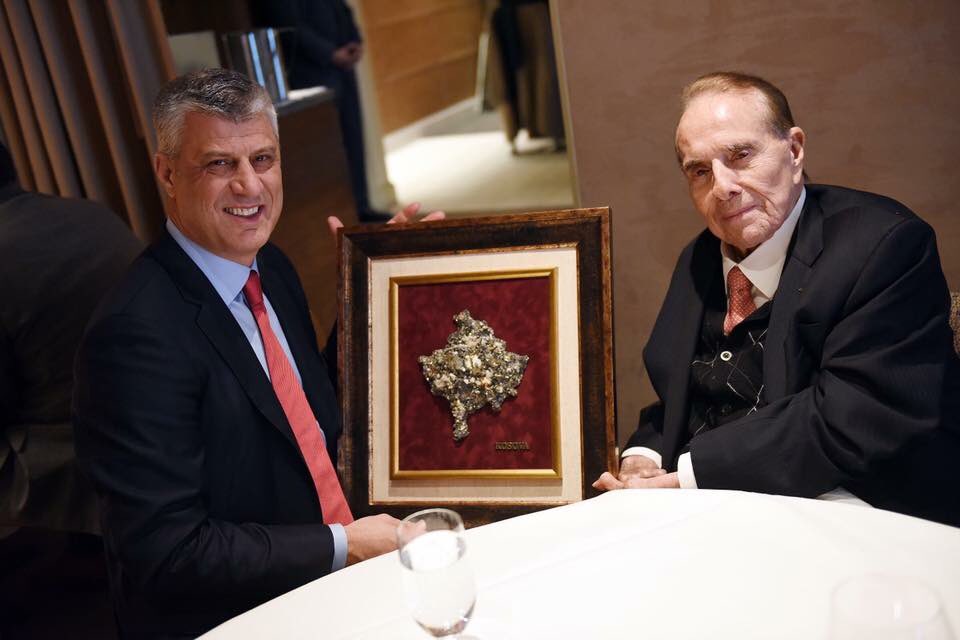
Former Kansas Senator Bob Dole, a Republican who ran against Bill Clinton for president in 1996, died on Sunday at the age of 98.
President Joe Biden called Mr. Dole—who survived serious battlefield wounds in Italy during World War II—”an American statesman like few in our history. A war hero and among the greatest of the Greatest Generation.”
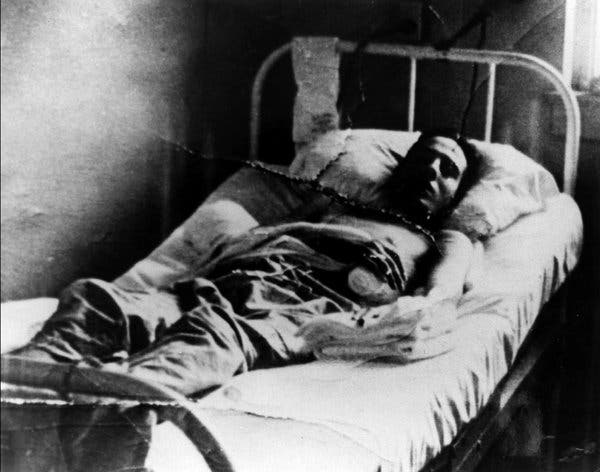
If Dole was among the greatest of the greatest generation, then the greatest generation really was not that great.
Nixon’s Hatchet Man and Super-Hawk
According to his New York Times obituary, Dole was a close confidante of Richard M. Nixon and made a name for himself in the U.S. Senate by zealously defending Nixon’s prosecution of the Vietnam War. Senator William Saxbe (R-OH) characterized Dole as “Richard Nixon’s hatchet man.”
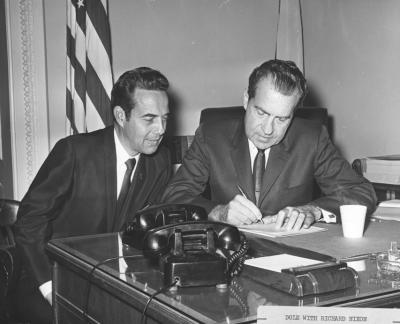
Though supportive of the expansion of food stamps and Americans with Disabilities Act of 1990, Dole opposed labor laws, consumer protection legislation, medical price controls, environmental regulations, and campaign finance reform.
On foreign policy issues, he was an ultra-hawk who often allied with Jesse Helms—the white supremacist Senator from North Carolina.
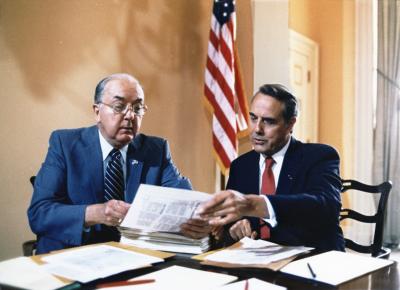
Friend to Lobbyists
In the early 1980s, Dole served as chairman of the Finance Committee, a powerful position that attracted big corporate donors often seeking favors. At one point he raised more money from special interests than any other senator.
A particularly generous donor was Dwayne Andreas, chairman of Archer Daniels Midland, the giant agribusiness; over two decades, the company received millions of dollars in tax breaks and federal subsidies.
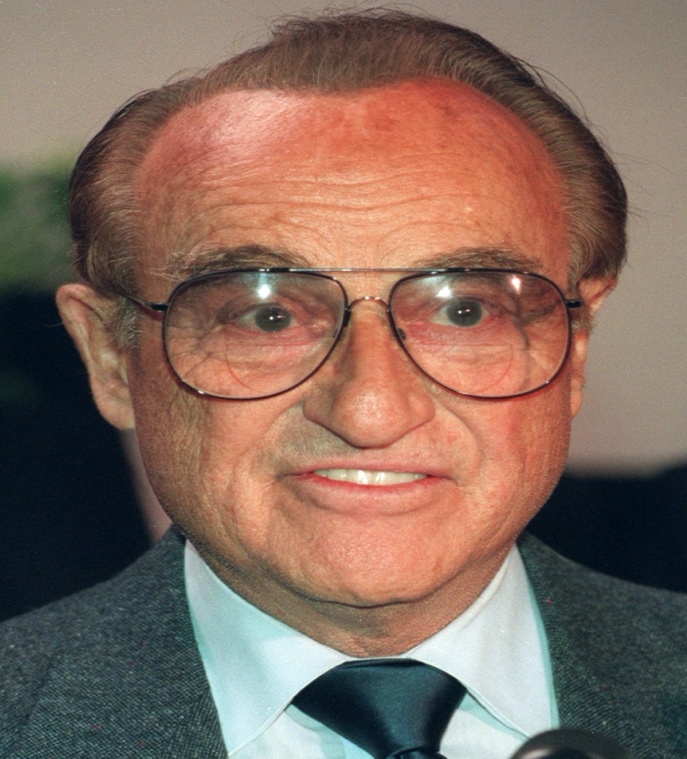
“When these political action committees give money, they expect something in return other than good government,” Mr. Dole bluntly told The Wall Street Journal, pinpointing why the system benefited wealthy interests over poor ones.
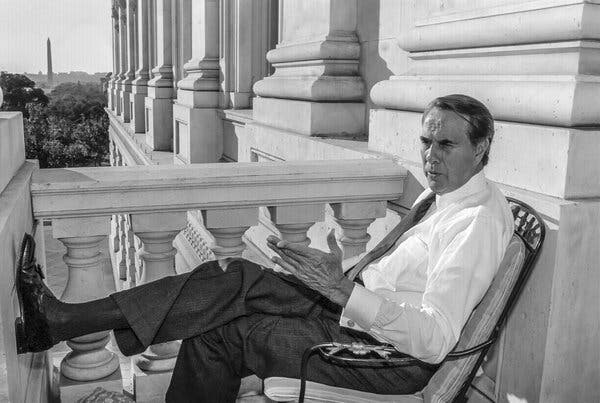
Pimp for the Albanian Lobby
During the 1990s, Dole essentially served as a pimp for the Albanian lobby, which pushed for the U.S. bombing of Kosovo to liberate the Albanians from Serb rule.
Dole first visited Kosovo in 1990 when he began championing the Kosovar Albanian cause.
After visiting again in 1998, he told dramatic tales of Serb human rights abuses and genocidal intent that were used to promote the U.S. bombing.
Dole’s view was contradicted by British human rights lawyer Geoffrey Robertson who reported to the House of Commons that the Albanian-led Kosovo Liberation Army (KLA) “were responsible for more deaths than the Yugoslav Serb army [under Serb leader Slobodan Milošević].”[1]
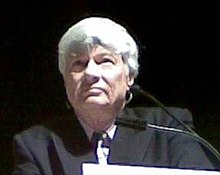
Geoffrey Robertson [Source: wikipedia.org] 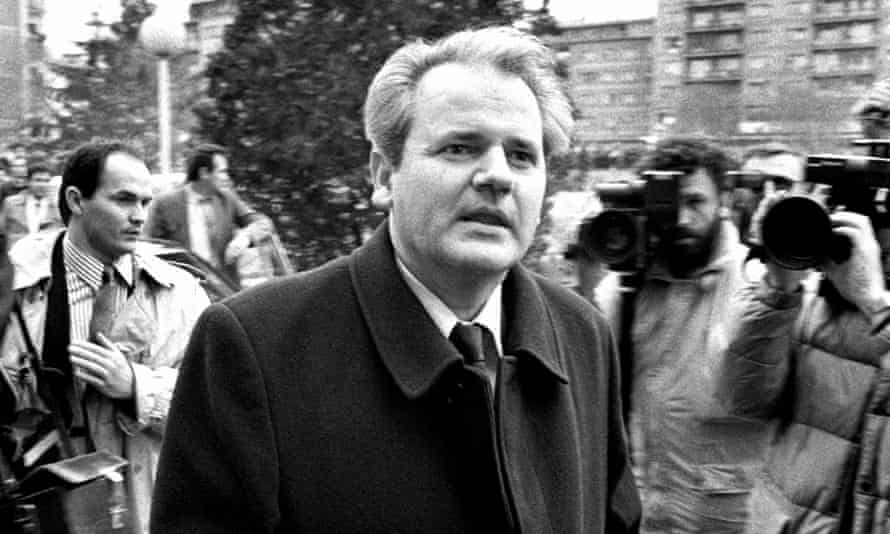
Slobodan Milošević after giving speech defending Serbs interest in Kosovo in 1989. [Source: theguardian.com]
Socialist leader Josef Broz Tito’s 1974 constitution had given Kosovo considerable autonomy within the Serbian republic, which enabled the Albanian population (about 90 percent of the total) to carve out a dominant position.
Ethnic cleansing of the Serb minority in the 1980s– which had experienced historical waves of pogroms including during World War II when the Kosovar Albanians allied with the fascist powers– created a political opening for Milošević, who in 1989 as head of the Serb Republic, stripped Kosovo of its autonomy and began taking measures to re-Serbianize it and crack down on opposition. [2]
The Kosovar Albanians subsequently established a secessionist republic, with a shadow government led by Ibrahim Rugova, which they sought to unite with Albania—a goal promoted by the Albanian lobby in the U.S. Congress that Dole headed.
In the late 1980s, Dole had forged a political alliance with Joseph DioGuardi, an Albanian American who gained election to Congress as a conservative Republican representing New York’s wealthy Westchester County. DioGuardi was dedicated to creating a Greater Albania and established a Political Action Committee (PAC) to raise money for congressmen like Dole that would champion this goal.
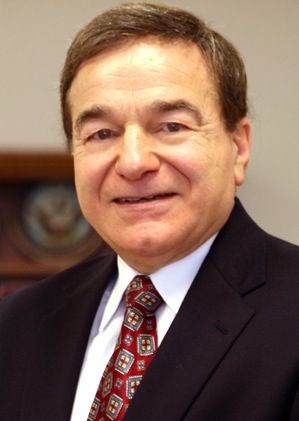
In early 1987, kicking off his 1988 bid to wrest the GOP nomination from then-vice president George H.W. Bush, Dole received $1.2 million from Albanian American supporters in New York City, while DioGuardi received $50,000 at the same dinner.
As the collapse of Yugoslavia loomed, the Croatian and Albanian lobbies continued their campaign: Defense & Foreign Affairs Strategic Policy reported in March 1993 that as much as $50 million was larded around Capitol Hill in a two-year period which saw the defeat of George Bush and led to Dole’s control of the Republican party.
It is no surprise then that Dole became a leading voice for war in Kosovo.
Or that he was an early and staunch champion of the KLA—even though it was designated as a terrorist organization by President Bill Clinton’s special envoy to the Balkans Robert Gelbard mere months before the U.S. commenced bombing Kosovo in March 1999.[3]
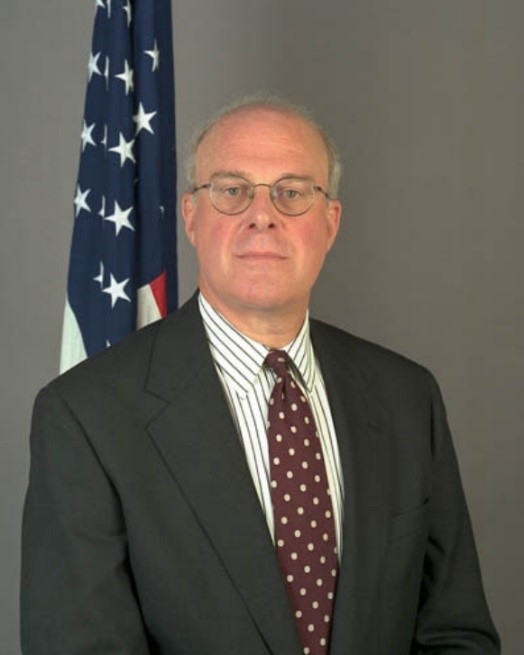
Some of the KLA fighters had trained in terrorist camps in Afghanistan and Pakistan, and were affiliated with a Turkish-jihadist group that was an offshoot of al Qaeda.[4]
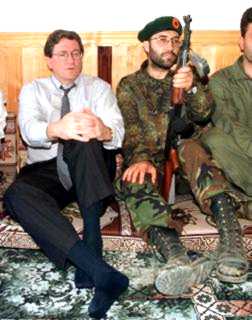
The KLA’s top commander, Hashim Thaçi, who served as Kosovo’s Prime Minister from 2008 to 2014 and president from 2016 to 2020, was accused of ordering the assassination of over a dozen KLA commanders and political moderates as part of an internal power struggle and was implicated in a scandal involving the sale of organs extracted from executed Serb prisoners.
A UN report accused him of having exerted violent control over the regional heroin trade and holding connection to a mafia cartel which moved drugs from Turkey to Western Europe through the “Balkans Route.”[5]
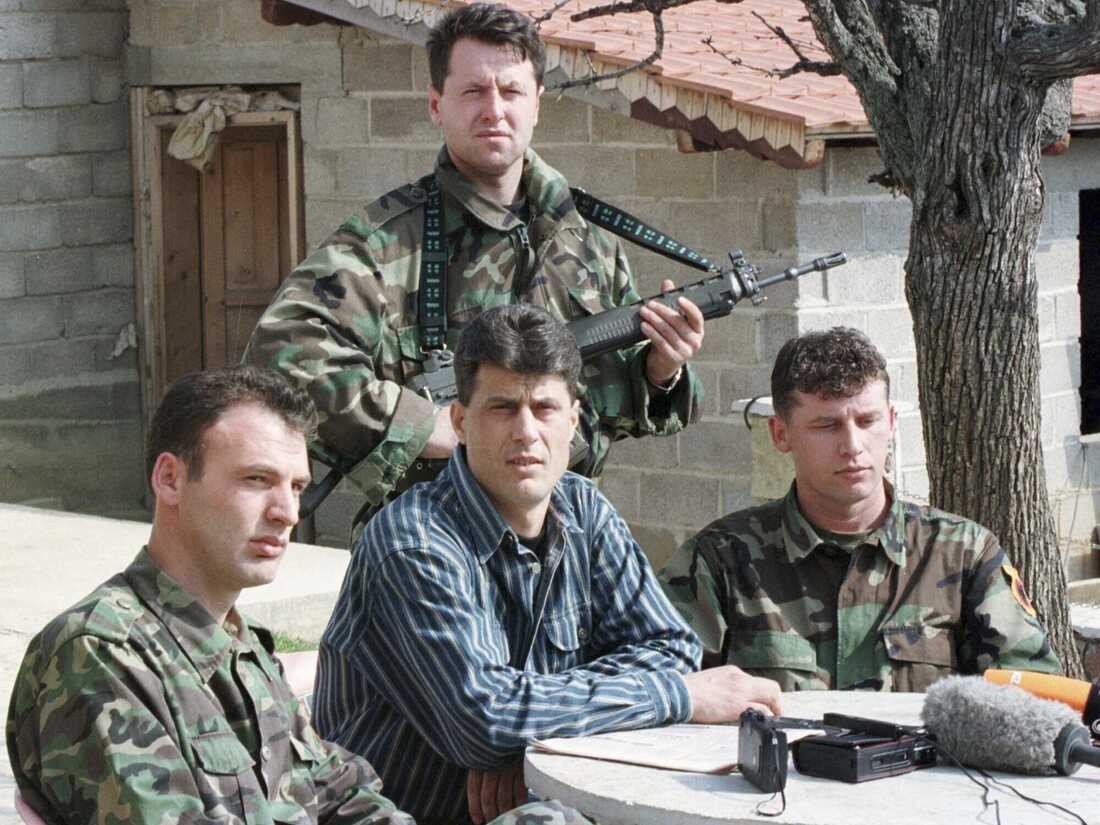
In June 2020, Thaçi was forced to cancel a trip to Washington after being indicted by a special court in the Netherlands for war crimes and crimes against humanity, including over 100 murders, forced disappearances and torture.[6] He is currently awaiting trial.
Dole was so close to Thaçi that, according to DioGuardi, Thaçi paid him $2.3 million Euros to write a preface to a self-promoting book.

After he became Prime Minister, Dole praised Thaçi for “creating a young country that is multicultural and tolerant, and that respects all communities”— though in fact, Kosovo under his rule became a haven for Islamic fundamentalists and drug and prostitution rings.[7]
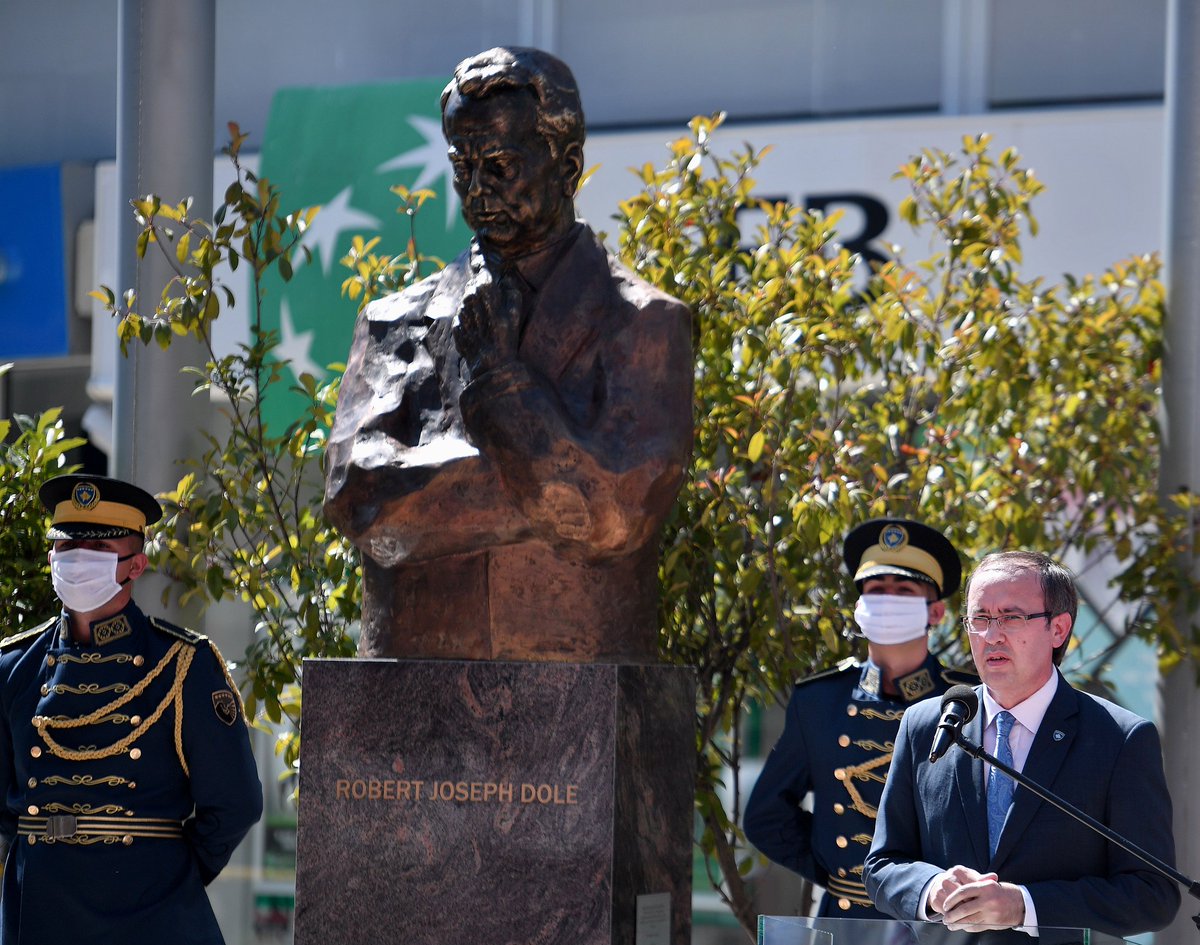
“A Most Impressive Leader”
In the early 1990s, the KLA had set up training camps in Albania, which was led at the time by Sali Berisha (1992-1997), to whom the U.S. provided over $200 million in aid to between 1993 and 1996.[8]
Dole called Berisha one of the “most impressive post-communist leaders.” Soon afterwards, he was driven from power due to involvement in a criminal extortion scheme that robbed Albanians of their life-savings.[9]
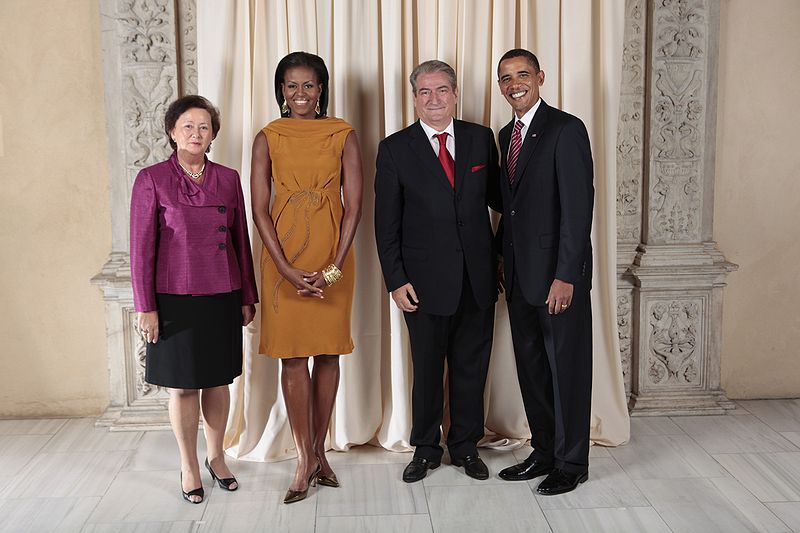
Croatian Lobby Too
The Croat lobby had been successful in the early 1990s in convincing Senator Dole to recognize their secession from the Yugoslav Federation—which broke it apart against Serb objections—and then in getting Dole to promote the repeal of an arms embargo.
According to journalist Diana Johnstone, the success of the anti-Serb lobbies at this time owed much to one of Senator’s Dole’s aides, Mira Radielovic Baratta, the daughter of Croatian nationalists who had emigrated to California.
She carved a niche as a “congressional expert on the Balkans,” and later served as a Deputy National Security Adviser under Donald Trump. Dole advisers Paul Wolfowitz, Richard Perle and Jeane J. Kirkpatrick, were said to be her biggest boosters.
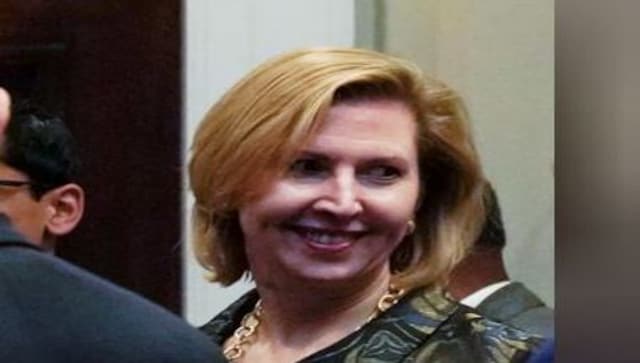
Johnstone writes that one factor to explain Baratta’s influence was “the appeal of right wing anticommunism, which portrayed Milošević’s Serbia as the last bastion of unrepentant socialism. Another was the opportunity of using the Albanian wild card to create a Balkan satellite hospitable to NATO bases.“[10]
Croatia’s leader at the time, Franjo Tudjman, had revived the traditional Croatian flag and coat of arms last used during the 1941-1945 pro-Nazi Ustase dictatorship and stripped the Serb minority in Croatia of citizenship, jobs, and land ownership.[11]
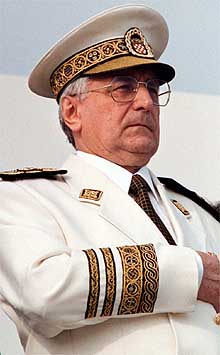
Tudjman’s one purpose in life, according to former British Foreign Secretary David Owen, was to control all the territory he believed belonged to Croatia historically—by any means.[12]
Whitewashing History
Mainstream media outlets predictably published sympathetic obituaries of Dole, characterizing him as a “giant of the Senate” (CNN), and “Old Soldier and Senate Stalwart” ( The New York Times).
New York Times writer Katharine Q. Seelye did acknowledge Dole’s ties to Dwayne Andreas and quoted him saying that lobbyists always demanded something in return for their money.

Seelye, however, did not take the next logical step of highlighting how Dole’s legislative record was compromised because of the lobbyists influence, and ignored Dole’s connection to the Albanian and Croatian lobbies, while framing his support for the war in Bosnia positively.
The piece generally invokes false nostalgia about the greatest generation and is emblematic of the denial of empire in America’s leading liberal publications and whitewashing of the historical record.

-
Noam Chomsky, A New Generation Draws the Line: Kosovo, East Timor and the Standards of the West (London: Verso, 2000), 34, 35, 106, 112.
For more on Dole’s background and the compromises he made throughout his career, see Stanley G. Hilton, Senator For Sale: An Unauthorized Biography of Senator Bob Dole (New York: St. Martin’s Press, 1995). -
Dr. Rajen Singh, “The Kosovo Crisis and the Quest for a Diplomatic Solution,” India Quarterly, 56, 1, 2 (January-June 2000), 1-2; David Gibbs, First Do No Harm: Humanitarian Intervention and the Destruction of Yugoslavia (Nashville, TN: Vanderbilt University Press, 2009), 176, 177. The Christian Science Monitor quoted a resident of Kosovo who stated that many of his fellow Albanians “want to drive the Serbs and Montenegrins from Kosovo. They talk of an ‘ethnically clean’ Kosovo.” ↑
-
Philip Shenon, “U.S. Says It Might Consider Attacking Serbs,” The New York Times, March 13, 1998. ↑
-
Peter Dale Scott, The Road to 9/11: Wealth, Empire, and the Future of America (Berkeley: University of California Press, 2007), 168; http://historycommons.org/context.jsp?item=complete_911_timeline_2861. ↑
-
Paul Lewis, “Report identifies Hashim Thaçi as big fish in organized crime,” The Guardian, June 24, 2011, https://www.theguardian.com/world/2011/jan/24/hashim-thaci-kosovo-organised-crime; Jerry Seper, “KLA Finances Fight with Heroin Sales: Terror Group is Linked to Crime Network,” The Washington Times, May 3, 1999; William Engdahl, Manifest Destiny: Democracy as Cognitive Dissonance (mine Books, 2018), 111, 112. Thaçi’s top deputy, Xhavit Haliti, was allegedly a big figure in the Albanian mafia where he was involved in gambling, prostitution and drug smuggling. Prince Dobrosh, the boss of the Kosovo-Albanian narco-mafia provided weapons to the KLA that were bought from heroin proceeds. “Rugova Meets with Albanian Narco-Boss in Prague,” https://balkania.tripod.com/resources/terrorism/kla-drugs.html#a25 ↑
-
Lewis, “Report identifies Hashim Thaçi as big fish in organized crime;” Doreen Carvajal and Marlise Simons, “Report Names Kosovo Leader as Crime Boss,” The New York Times, December 15th, 2010; Shawn Walker and Julian Borger, “Kosovo president Hacim Thaçi indicted on war crimes charges,” The Guardian, June 24, 2020; Dan Bilefsky, “Kosovo’s Thaçi Aspires to Statesmanship, but Guerillla Past Haunts Him,” The New York Times, July 12, 2013; James Bovard, “America’s Forgotten Bullshit Bombing of Kosovo,” Counterpunch, August 20, 2019, https://www.counterpunch.org/2019/08/20/americas-forgotten-bullshit-bombing-of-serbia/. A KLA member referred to the KLA as a “rogue’s gallery of drug dealers, criminals and terrorists.” ↑
-
On Sunday, Kosovo’s former prime minister, Ramush Harafdnaj, wrote that “Senator Dole remains one of the main figures that identifies Kosovo’s path to statehood. He was one of the first politicians to recognize our struggle for freedom.” In 2019, Haradinaj resigned after a war crimes court in The Hague summoned him for questioning as a suspect. He stood accused with Thaçi of overseeing a campaign of torture and murder against ethnic Serbs during the Balkans conflict that Dole championed. ↑
-
Michael Radu, “Don’t Arm the KLA,” Foreign Policy, April 1, 1999, https://www.fpri.org/article/1999/04/dont-arm-the-kla/; Bill Clinton letter to Carl Levin, “Situation in Albania,” May 4th, 1995, Clinton Presidential Library, Digital Archive, Republic of Albania, https://clinton.presidentiallibraries.us/items/show/99718 ; Eliot Engel to the President, July 29, 1994, Clinton presidential Library, Digital Archives, Albania, https://clinton.presidentiallibraries.us/items/show/99706; Human Rights Watch Report, 1998 Albania, https://www.refworld.org/docid/3ae6a8a40.html. Berisha opened Albania’s economy to Western multinationals and banks and when he became prime minister again in 2009, had Albania join NATO. A group of congressmen that included Eliot Engel (D-NY); Joseph Kennedy II (D-MA) and Ronald Dellums (D-CA) wrote a letter to Clinton referring to Berisha as a “bulwark of peace and stability” in the region. Letter to President Clinton, July 21, 1994, Clinton Presidential Library Digital Archive, https://clinton.presidentiallibraries.us/items/show/99707 ↑
-
“Was Albania’s Ex-President Sending Arms to Kosovo Liberation Army Terrorists?” Sputnik News, June 4, 2017, https://sputniknews.com/europe/201704061052357541-berisha-kla-arms/; Chris Hedges, “Kosovo Rebels and Their New Friend,” The New York Times, June 9, 1998. On Berisha’s ties to the Albanian mafia and drug trafficking, see Marko Milivojevic, “The Balkans Medellin,” Jane’s Intelligence Review, February 1, 1995, 7, 2 68, https://balkania.tripod.com/resources/terrorism/kla-drugs.html#a25 ↑
-
Diana Johnstone, Fools Crusade: Yugoslavia, NATO and Western Delusions (New York: Monthly Review Press, 2002), 231, 232. ↑
-
Warren Zimmerman, Origins of a Catastrophe: Yugoslavia and Its Destroyers – America’s Last Ambassador Tells What Happened and Why (New York: Random House, 1996), 75; Gibbs, First Do No Harm, 87; Hidden Agenda: U.S./NATO Takeover of Yugoslavia, ed. John Catalinotto and Sarah Flounders (New York: international Action Center, 2002), xx; Gary Wilson, “The Dayton Accords Reshape Europe,” in NATO in the Balkans: Voices of Opposition, ed. Sarah Flounders, Ramsey Clark, Sean Gervasi et al. (New York: International Action Center, 1998), 151. According to a New York Times profile, Tudjman came to power helped by financing from anticommunist Croatian emigres in the U.S. and Canada. Many had fascist leanings and were financed by the CIA. ↑
-
David Owen, Balkan Odyssey (New York: Harcourt Brace & Jovanovich, 1995), 74. In 1989, the year before his election, Tudjman wrote a book with passages like: “A Jew is still a Jew. Even in the camps they retained their bad characteristics: selfishness, perfidy, meanness, slyness and treachery.” Quoted in Jack Cashill, Ron Brown’s Body: How One Man’s Death Saved the Clinton Presidency and Hillary’s Future (Nashville, TN: WND Books, 2004), 284. ↑
CovertAction Magazine is made possible by subscriptions, orders and donations from readers like you.
Blow the Whistle on U.S. Imperialism
Click the whistle and donate
When you donate to CovertAction Magazine, you are supporting investigative journalism. Your contributions go directly to supporting the development, production, editing, and dissemination of the Magazine.
CovertAction Magazine does not receive corporate or government sponsorship. Yet, we hold a steadfast commitment to providing compensation for writers, editorial and technical support. Your support helps facilitate this compensation as well as increase the caliber of this work.
Please make a donation by clicking on the donate logo above and enter the amount and your credit or debit card information.
CovertAction Institute, Inc. (CAI) is a 501(c)(3) non-profit organization and your gift is tax-deductible for federal income purposes. CAI’s tax-exempt ID number is 87-2461683.
We sincerely thank you for your support.
Disclaimer: The contents of this article are the sole responsibility of the author(s). CovertAction Institute, Inc. (CAI), including its Board of Directors (BD), Editorial Board (EB), Advisory Board (AB), staff, volunteers and its projects (including CovertAction Magazine) are not responsible for any inaccurate or incorrect statement in this article. This article also does not necessarily represent the views the BD, the EB, the AB, staff, volunteers, or any members of its projects.
Differing viewpoints: CAM publishes articles with differing viewpoints in an effort to nurture vibrant debate and thoughtful critical analysis. Feel free to comment on the articles in the comment section and/or send your letters to the Editors, which we will publish in the Letters column.
Copyrighted Material: This web site may contain copyrighted material the use of which has not always been specifically authorized by the copyright owner. As a not-for-profit charitable organization incorporated in the State of New York, we are making such material available in an effort to advance the understanding of humanity’s problems and hopefully to help find solutions for those problems. We believe this constitutes a ‘fair use’ of any such copyrighted material as provided for in section 107 of the US Copyright Law. You can read more about ‘fair use’ and US Copyright Law at the Legal Information Institute of Cornell Law School.
Republishing: CovertAction Magazine (CAM) grants permission to cross-post CAM articles on not-for-profit community internet sites as long as the source is acknowledged together with a hyperlink to the original CovertAction Magazine article. Also, kindly let us know at info@CovertActionMagazine.com. For publication of CAM articles in print or other forms including commercial internet sites, contact: info@CovertActionMagazine.com.
By using this site, you agree to these terms above.
About the Author

Jeremy Kuzmarov holds a Ph.D. in American history from Brandeis University and has taught at numerous colleges across the United States. He is regularly sought out as an expert on U.S. history and politics for radio and TV programs and co-hosts a radio show on New York Public Radio and on Progressive Radio News Network called “Uncontrolled Opposition.”
He is Managing Editor of CovertAction Magazine and is the author of six books on U.S. foreign policy, including Obama’s Unending Wars (Clarity Press, 2019), The Russians Are Coming, Again, with John Marciano (Monthly Review Press, 2018), Warmonger. How Clinton’s Malign Foreign Policy Launched the U.S. Trajectory From Bush II to Biden (Clarity Press, 2023); and with Dan Kovalik, Syria: Anatomy of Regime Change (Baraka Books, 2025).
Besides these books, Kuzmarov has published hundreds of articles and contributed to numerous edited volumes, including one in the prestigious Oxford History of Counterinsurgency .
He can be reached at jkuzmarov2@gmail.com and found on substack here.


Thanks. I fixed that Geoffrey Robertson was rather a British human rights lawyer and not defense secretary.
The Geoffrey Robertson you picture and link to was never the British Defence Secretary. Stopped reading at that point.
Dr. Vladimir Zelenko exposed executives that are taking hydroxychloroquine and ivermectin prophylactically. They are not taking the vaccine! These drugs are all on the World Health Organization’s “Model List of Essential Medicines” website. Unfortunately doctors are shamed, black mailed by certain individuals and even SUSPENDED by administration in order not to prescribe these medicines. Get your Ivermectin ivmpharmacy/com